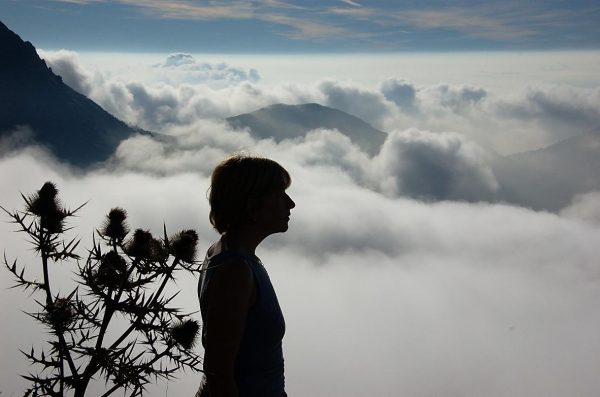Unless we find ourselves on an exciting vacation somewhere far from home, it seems that nothing can conceivably be more uneventful than a Monday morning in mid-July.
The only “variety” offered seems to be found in the weather: Will it rain or will the sun shine? Will the blistering heat continue, or will we feel some relief? At this point in the summer, we may have already been on vacation—which means that there isn’t much to look forward to—or we are awaiting an upcoming trip that at least fills us with some sense of anticipation and “escape.” (All of which poses a further question: are our carefully-planned vacations—into which we invest so much time, energy, money, and even hope—always as rewarding, relaxing, and renewing as anticipated? I suppose that can only be assessed once we have returned—hopefully as intact as when we departed!)
Adding to our spiritual ennui is, admittedly, the fact that July is the most uneventful month of the year liturgically: no major fasts or feasts occur during this month. With vacationing parishioners, there can be a noticeable drop in church attendance. There may also be certain signs of “spiritual laziness” setting in (induced, perhaps, in part by the haziness of the weather) leading to that condition of spiritual torpor known in our spiritual literature as acedia.
July, therefore, is a month-long stretch of spiritual desert, for we celebrated the Feast of Saints Peter and Paul at the end of June and await the major Feasts of the Transfiguration and the Dormition in August, within the context of the two-week fast from August 1–14. Basically, there is “only” the Divine Liturgy on Sundays and the commemoration of a few well-known saints throughout the month.
Of course, we never want to find ourselves saying that there is “only” the Liturgy on Sunday mornings. The word “only” is hopelessly inadequate when applied to the Lord’s Day celebration of the Eucharist!
“Only” implies “uneventful, yet every Liturgy is the actualization of the Paschal Mystery of the Death and Resurrection of Christ, and our participation in that mystery: “Remembering this saving commandment and all those things which have come to pass for us: the Cross, the Tomb, the Resurrection on the third day, the Ascension into heaven….” And every Liturgy is simultaneously the actualization of the Pentecostal mystery of the sanctifying presence of the Holy Spirit: “Send down Thy Holy Spirit upon us and upon these gifts here offered….”
At every Liturgy we proclaim and bless the presence and power of the kingdom of heaven. We are praying to and praising the Holy Trinity together with the angels and the saints. We are in direct communion with God and one another in the Liturgy. This means that every Liturgy is “eventful” in a manner that we can barely comprehend!
If, indeed, the summer proves to be something of a spiritual drought, then we can only thank God for the weekly liturgical cycle that begins and culminates with the Divine Liturgy on the Lord’s Day so that we can recover and renew our genuine humanity that has been created, redeemed, and transformed “in Christ.”
To speak of our life “in Christ” on the communal level, we believe that at every Liturgy we anticipate the messianic banquet, where and when “many will come from east and west and sit at table with Abraham, Isaac, and Jacob in the kingdom of heaven” (Matthew 8.11). The heavenly manna, or the “Bread from heaven” that we receive by the grace of God, strengthens us in the somewhat outward and inward “desert-like” conditions of the world around or within us.
On a more interior level, we may one day make the wonderful discovery that we need not travel far away geographically in order to embark upon a life-transforming journey. In the Prologue to his book The Orthodox Way, Metropolitan Kallistos Ware relates the following anecdote.
One of the best known of the Desert Fathers of the fourth-century Egypt, Saint Sarapion the Sidonite, travelled once on pilgrimage to Rome. Here he was told of a celebrated recluse, a woman who lives always in one small room, never going out. Skeptical about her way of life—for he was himself a great wanderer—Sarapion called on her and asked: “Why are you sitting here?” To this she replied: “I am not sitting, I am on a journey.”
Admittedly, this will not work well with children! But at one point in our lives, we need desperately to make that discovery of our interior depths wherein we find a point of stillness that will further still our excessive restlessness that endlessly pushes us “outward” rather than “inward.” In one of my other favorite sentences in The Orthodox Way, Metropolitan Kallistos puts it this way:
“We are on a journey through the inward space of the heart, a journey not measured by the hours of our watch or the days of the calendar, for it is a journey out of time into eternity.”
“Vacations” are one thing, and “journeys” (or pilgrimages) another. The packaging and planning of the former make them much more predictable that the limitless possibilities of the latter. So, as we plan our outward vacations by plane or car, we need make provisions for the interior journeys into the greater space of our hearts through “faith, hope, and love,” as well as through the practices of prayer and fasting, so as to remain attentive to the “still voice of God” that gives direction and meaning to our lives. Be that as it may, we pray that God will bless us on both forms of our travels!
Whatever the state of our journey, the following passage from the Scriptures may inspire us to see beyond the tedium that leads to the forgetfulness of God: “Therefore lift your drooping hands and strengthen your weak knees, and make straight paths for your feet, so that what is lame may not be put out of joint but rather healed” (Heb 12.12–13).

















